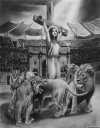josé miguel tecles verdú
Governor
Can you tell me any Hentai with crucifixions please? Thank you.

Hmm... without nails???I don't know about Hentai series that contain crucifixions, but there are lots of photos that are searchable on Google. This one, for example ranks among the "great pictures" I think.
View attachment 919597
You'll have to speak to the two shadowy fellows there about that. I just found the pic.Hmm... without nails???
Exactly! Shoes on the cross? No! Ney! Never!Too many shoes.
It's a preventative measure. Sadly, many folks being led to their crucifixions get cold feet.Exactly! Shoes on the cross? No! Ney! Never!
Take off your sandals for this is a holy cross. Aka lemme see them toes.Exactly! Shoes on the cross? No! Ney! Never!
Thanks for the translation Loxoru!View attachment 921009
I read the text below as :
"Who wants to have it good, must push back evil.
Who wants to live with God, must die inside.
Those who want to rest in peace with Christ.
Must free themselves of the cross of lust."
Curiuosly, the point is made using an erotic crux scene.
Yes!Take off your sandals for this is a holy cross. Aka lemme see them toes.
View attachment 921009
I read the text below as :
"Who wants to have it good, must push back evil.
Who wants to live with God, must die inside.
Those who want to rest in peace with Christ.
Must free themselves of the cross of lust."
Curiuosly, the point is made using an erotic crux scene.




Tricky thing, freeing oneself of the cross of lust. One wonders a bit what the point is of resting in peace with Christ. I suppose it's quite restful, being free of lust, but you know, I rather enjoy lust as well.View attachment 921009
I read the text below as :
"Who wants to have it good, must push back evil.
Who wants to live with God, must die inside.
Those who want to rest in peace with Christ.
Must free themselves of the cross of lust."
Curiuosly, the point is made using an erotic crux scene.

This title catches it all.This paper engraving was made around 1580 by Hendrik Goltzius and it is titled ““Man Must Kill His Desires.” It is in the collection of the Museum Boijmans Van Beuningen in Rotterdam, Netherland.
Killing desires and lust during your brief Earthy life, to enjoy eternal glory for your eternal soul, in Heaven, next to God!Tricky thing, freeing oneself of the cross of lust. One wonders a bit what the point is of resting in peace with Christ. I suppose it's quite restful, being free of lust, but you know, I rather enjoy lust as well.
Okay, but I see no point in God creating a world full of pleasures and interests, and a state of being where one desires those things, only to make avoiding those desires and temptations a precondition to eternal happiness. I'm sure I could work up a theological argument, but it still always ends up in some sort of puritan nonsense where you have to live an austere and morbid life just to be happy after you die. It seems like a waste of perfectly good earthly pleasures.Killing desires and lust during your brief Earthy life, to enjoy eternal glory for your eternal soul, in Heaven, next to God!
Neither do I see, the point, but it actually seems to be the whole point of many religions. That's what they were invented for! The theological argument, I have once been told by a philosophy professor, was to give a sense to death and suffering. Remember, there have not so long been times that patients suffering in terminal agony 'had to suffer', from a doctrine, that hence they were 'earning' a place next to God for their soul. Such was decreed by church and even brought into practice by medical staff, in Catholic hospitals. Attempts to ease the suffering (including euthanasia as the most prominent) were refused (of course, they were not so advanced as today in palliative care).Okay, but I see no point in God creating a world full of pleasures and interests, and a state of being where one desires those things, only to make avoiding those desires and temptations a precondition to eternal happiness. I'm sure I could work up a theological argument, but it still always ends up in some sort of puritan nonsense where you have to live an austere and morbid life just to be happy after you die. It seems like a waste of perfectly good earthly pleasures.
Okay, but I see no point in God creating a world full of pleasures and interests, and a state of being where one desires those things, only to make avoiding those desires and temptations a precondition to eternal happiness. I'm sure I could work up a theological argument, but it still always ends up in some sort of puritan nonsense where you have to live an austere and morbid life just to be happy after you die. It seems like a waste of perfectly good earthly pleasures.
Neither do I see, the point, but it actually seems to be the whole point of many religions. That's what they were invented for! The theological argument, I have once been told by a philosophy professor, was to give a sense to death and suffering. Remember, there have not so long been times that patients suffering in terminal agony 'had to suffer', from a doctrine, that hence they were 'earning' a place next to God for their soul. Such was decreed by church and even brought into practice by medical staff, in Catholic hospitals. Attempts to ease the suffering (including euthanasia as the most prominent) were refused (of course, they were not so advanced as today in palliative care).
The other side of this doctrine is that joy and lust are 'bad' and have to be banned from one's miserable life.
Well, not that I want to continue to derail phlebas' thread here (and if this continues, we will have to create a discussion thread and move posts), but I think "opiate of the masses" meant that it dulled them into acceptance of their lot in life. Religion, as Loxuru notes, has always been a key tool in social control, and the Roman Catholic obsession with suffering (noted by Loxuru) and the puritan obsession with austerity and self-denial both play to that creation of social order and control, especially of women. Poor Mary (the Virgin), in Catholic theology wasn't even allowed to have sex with Joseph after Jesus birth, but had to remain a "blessed virgin" forever in order to be pure in their eyes. I always wondered what was so blessed about being a virgin - all the trouble of childbirth, without any of the fun bits. In that way, we see that religion is usually not only about social control generally, but also obsessed with sexual regulation and control specifically. And since religion is supposed to come from God (or several gods, perhaps), you can't really question it - you are promised a better "afterlife" in return for denying yourself this one.Wasn’t it Karl Marx who said “religion is the opiate of the masses”?

Look at this! A crucified beaver, having its last meal before RIP.

